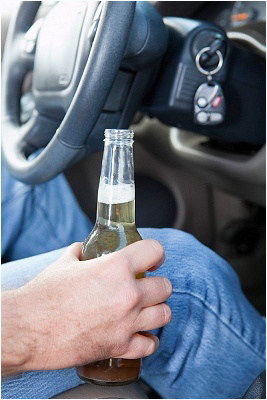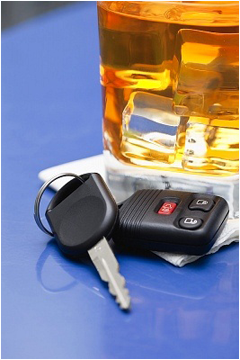“Don’t drink and drive” is a common message we adhere to in our daily lives almost without thinking. It keeps you, your car, your passengers as well as pedestrians out of danger, and reduces the chances of damaging property. Now it does happens sometimes that you have had a few drinks and you need to drive back home. This is the point where things start getting dangerous. Alcohol impairs judgment and basic functions like vision and perception. Driving under the influence of any sort of intoxicant is not only hazardous for you but for everyone around you as well.
Auto insurance is designed to protect your car from damage, loss or any sort of accidental occurrences. On the other hand, an accident which occurs after drinking and driving cannot be deemed as an accident. This is because the driver could have chosen not to drink and in doing so, avoid the accident altogether. Thus, auto insurance and DUI/DWI laws are closely interlinked. Both are designed to protect property and lives.
What is DUI?
The National Highway Traffic Safety Administration had calculated that at least one alcohol related driving fatality occurred every 48 minutes. The states are enforcing DUI/DWI laws to discourage drunk driving and imposing heavy penalties. DUI is a complex bit of legislation and it has manifold effect on an individual’s record.
Blood Alcohol Content (BAC) is a measure of how much alcohol you have in your system. It is usually measured by testing blood, urine or breath, and traffic cops carry the necessary equipment to perform tests on spot. One fluid ounce (about 30ml) of alcohol raises the BAC in an average person’s body by 0.03%. The BAC limit for every state in the US is fixed at 0.08% for adult private vehicle drivers, 0.04% for commercial vehicle drivers and 0.02% for minors (under 21 years of age).
What are the penalties?
If you have been caught driving under the influence of alcohol or any other intoxicant, the penalties and legal ramifications are huge. First time offenders are penalized with:
 • A fine which ranges somewhere between $750 and $1500
• A jail term which can be as long as 6 months
• Driver’s license suspension for a period of 12 months to 2 years
• A court order to install an ignition interlock (only applicable if BAC is 0.20 or more)
• Court ordered community service for a specified number of hours
• Mandatory enrollment in a substance abuse program under court order
• Possible enrollment in driver improvement program under court order
• A fine which ranges somewhere between $750 and $1500
• A jail term which can be as long as 6 months
• Driver’s license suspension for a period of 12 months to 2 years
• A court order to install an ignition interlock (only applicable if BAC is 0.20 or more)
• Court ordered community service for a specified number of hours
• Mandatory enrollment in a substance abuse program under court order
• Possible enrollment in driver improvement program under court order
If you manage to obtain a restricted license under probation, you will need to file a lot of paper work and you may even have to install the ignition interlock.
What are the insurance related problems?
Insurance becomes a major issue for anyone convicted of DUI or DWI. It is mandatory to fill out an SR22 insurance form and file it with your insurance company. The SR22 insurance form is a proof of financial responsibility which shows that you are carrying the bare minimum coverage that is required to drive. The minimum coverage limit varies from state to state. Under SR22, bodily injury liability  and property damage liability are covered. If you have auto insurance, you can file it with your insurance company. The cost of filing will be somewhere between $20 and $30 but if you want to obtain a restricted driving permit, you’ll need to pay another $100 to $300.
and property damage liability are covered. If you have auto insurance, you can file it with your insurance company. The cost of filing will be somewhere between $20 and $30 but if you want to obtain a restricted driving permit, you’ll need to pay another $100 to $300.
Filing an SR22 will automatically put you in the high risk category. In turn it will increase your premium rates by 3 to 5 times of what you were paying. Yes, it is costly! A DUI conviction on your record entails more severe problems. There are greater hurdles than just the cost. Your current insurance company might cancel your policy and drop your coverage. They can refuse to cover you for damages to the vehicle (if there is any).
A first offence DUI or DWI will affect your insurance rates for the next 3 to 5 years and every subsequent conviction will lengthen that time period. Even if you try to change carriers, they will look into your record and find out you have a DUI charge. They may choose to reject your application or charge you an exorbitant premium.
The FR44
An FR44 is a new type of high risk liability insurance that carries double or greater amount of minimum coverage than SR22. Increased coverage means greater protection for all parties involved. The FR44 costs significantly more than the SR22 and as such the greater financial burden of a heavy premium deters drivers from repeating the offense.
The upside of buying FR44 insurance is that the policy holders, having carried high liability limits, become eligible for greater discounts when they renew their policy. Furthermore, carrying so much liability and bearing such a heavy financial burden makes the driver more aware of his actions, and thus modifies his driving qualities for the better.
Insurance, being an instrument of protection against liability, protects you from major financial and legal problems that come with a DUI conviction. Your premium rates may go up in the process but it saves you from greater damage. A DUI or a DWI is a terrible conviction to have on your record. It affects your life on a financial, professional as well as on a personal level. You cannot pay for a life lost in a drunk driving accident with all the money in the world, neither can you mend your reputation.
Drink responsibly, drive safe and always carry insurance.